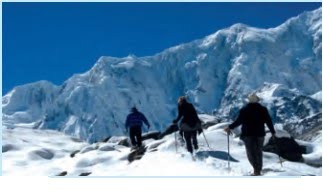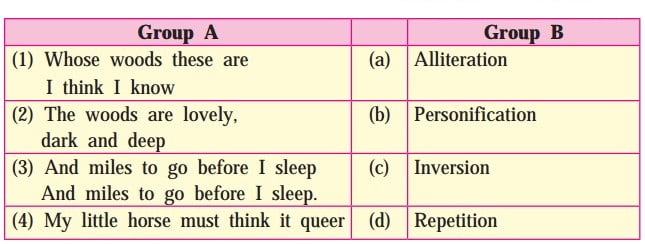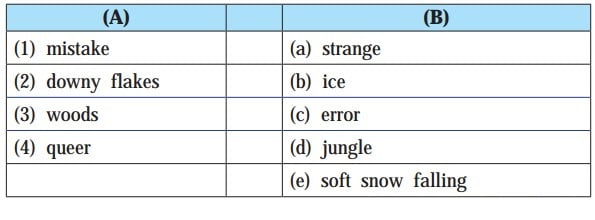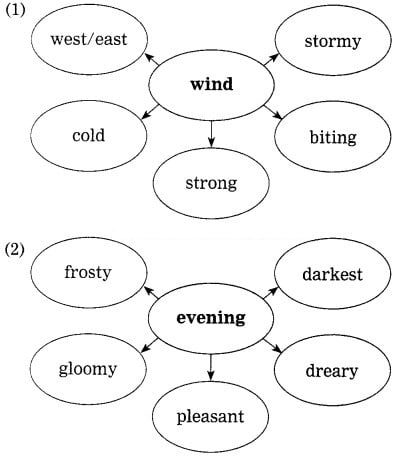Chapter 3.3 Stopping by Woods on a Snowy Evening
Textbook Questions and Answers
Warming up:
Chit-chat
Share this chat with your classmate:
Question 1.
Where did you go for a picnic recently?
Answer:
Recently I went to Mahabaleshwar.
Question 2.
Who all accompanied you?
Answer:
My family members accompanied me.
Question 3.
Why did you select that picnic spot?
Answer:
It is very close to Mumbai. We could enjoy the scenic beauty, invigorating and refreshing climate so we selected that picnic spot.
Question 4.
What games/food/sights did you enjoy there?
Answer:
We enjoyed Antakshari on the way. We also enjoyed veg, non-veg food. We visited different points, Venna lake, Panchgani and Pratapgarh.
Question 5.
What did you feel when it was time to return home?
Answer:
The memories of our pleasant picnic were unforgettable. The picnic was a nice change in our dull routine life. We returned home happily with refreshed minds.
(Note: Students may share their own experience with classmates based on the above guidelines.)
1. Look at the picture given on textbook page 101 and frame questions:
Question 1.
Look at the picture given on textbook page 101 and frame questions:

(a) Where are the trekkers trekking?
(b) …………………………………………… .
(c) …………………………………………… .
(d) …………………………………………… .
(e) …………………………………………… .
Answer:
(a) Where are the trekkers trekking?
(b) Which season is it?
(c) What equipment do you think they are carrying?
(d) In which region of India do you find such trekkers?
(e) What is the role of mountaineers in such trekking?
2. Form group of 4 to 6 students. Every student should close his/her eyes. As the group leader reads aloud the following lines, the students try to create a picture in his/her mind. Later, each one gives a heading for each description.
Question (a)
Bright blue sky – soft white clouds sweeping by tiny specks of birds flying high – sun playing hide and seek behind the clouds.
Heading: ………………………….. .
Answer:
Heading: The Enchanting Beauty of the Sky.
Question (b)
Miles of smooth barren land – sparkling sand stretched till the horizon, in wave – like forms – thorny, cacti propping here and there – an occasional cluster of palms provide a shady spot – a carvan of camels moving in a line in the distance.
Heading: ………………………….. .
Answer:
Heading: Life in the Desert
Such a figurative description that creates mental pictures, in the mind of the reader/listener is called Imagery. It is a poetic device that enhances the poem.
Compose in your group, a four to six-line poem, which contains imagery.
(1) A host of golden daffodils,
Beside the lake, beneath the trees,
Fluttering and dancing in the breeze,
Continuous as the stars that shine
And twinkle on the milky way.
(2) The night was black as ever,
but bright stars lit up the sky in beautiful and
varied constellation which were sprinkled
across the astronomical landscape.
English Workshop:
1. Put (✓) mark in front of True statement or (✗) mark in front of False statement:
Question 1.
Put (✓) mark in front of True statement or (✗) mark in front of False statement:
(Answers are directly given.)
Answer:
- The speaker stops to watch rain falling among the trees. (✗)
- The owner of the woods is known to the speaker. (✓)
- The horse is worried about the cold and wants to keep going. (✗)
- The speaker doesn’t emphasize upon the beauty of woods he is passing through. (✗)
2. Find outline/lines from the poem as a proof for the following explanation:
Question (a)
There is no one to catch the speaker trespassing.
Answer:
He will not see me stopping here
To watch his woods fill up with snow.
Question (b)
The little horse draws his master’s attention.
Answer:
He gives his harness bells a shake
To ask if there is some mistake.
Question (c)
His horse seems anxious to keep going.
Answer:
My little horse must think it queer
To stop without a farmhouse near.
Question (d)
The speaker prefers to stay but is forced to move onwards.
Answer:
But I have promises to keep And miles to go before I sleep ….
Question (e)
The poem is set in bygone era.
Answer:
He gives his harness bells a shake. Shows that the poem is set in the bygone era.
3. The poem is believed to have a reference to the poet’s life itself. What could the following signify? Choose from the brackets below:
Question 1.
The poem is believed to have a reference to the poet’s life itself. What could the following signify? Choose from the brackets below: (duties and responsibilities/old age/life/death/ everlasting peace)
Answer:
- The speaker’s journey – life
- Snowy Evening – old age
- Lovely, deep, dark woods – everlasting peace
- Promises – duties and responsibilities
- Sleep – death
4. Tell whether the rhyming scheme of the following stanzas is right or wrong. Give the correct rhyme scheme for the wrong one:
Question 1.
Tell whether the rhyming scheme of the following stanzas is right or wrong. Give the correct rhyme scheme for the wrong one:
Answer:
- stanza 1 – aaba : right
- stanza 2 – bbcb : wrong – it is ‘aaba’
- stanza 3 – ccdc : wrong – it is ‘aaba’
- stanza 4 – dded : wrong – it is aaaa’
5. Give your own rhyming words for the following: (Answers are directly given.)
Question 1.
Give your own rhyming words for the following: (Answers are directly given.)
Answer:
- house – spouse
- woods – goods
- easy – busy
- wind – skinned
- dark – bark
- watch – botch
6. Match the lines of the poem with their figures of speech:
Question 1.
Match the lines of the poem with their figures of speech:

Answer:
- Whose woods these are I think I know – Inversion
- The woods are lovely, dark and deep – Alliteration
-
And miles to go before I sleep
And miles to go before I sleep. – Repititon - My little horse must think it queer – personification
7. Match the words given in Group A with their meanings in Group B:
Question 1.
Match the words given in Group A with their meanings in Group B:

Answer:
- mistake – error
- downy flakes – soft snow falling
- woods – jungle
- queer – strange
8. Complete the following web-diagrams by adding suitable describing words in the boxes.
Question 1.
Complete the following web-diagrams by adding suitable describing words in the boxes. (Answers are directly given.)

Answer:

9. Pick out lines from the poem that contain imagery. Write them in your notebook.
Question 1.
Pick out lines from the poem that contain imagery. Write them in your notebook.
10. Prepare a set of questions to interview:
Question (a)
a person who has just returned from a trek in the woods:
Answer:
- Welcome back, how did you feel when you visited the woods?
- What was the purpose of your visit?
- Did you take any precautions while roaming in the woods?
- Which strange or rare things did you find in the woods?
- Did you come across any wild animals ? What was your feeling then?
- How did you manage to get your food, water and other essential things ?
- What difference did you find in the woods and the place where you live?
- Were you able to fulfil your expectations from this visit?
- What should be your role to conserve the woods?
- Would you like to suggest the youngsters to undertake such expeditions? Why?
Question (b)
a person who has recently scaled Mt. Everest:
Answer:
- Welcome back, What preparations did you make before the climb?
- What did you do to stay fit when you were at the base?
- What did you do to make your climb interesting?
- What food did you take along with you while climbing?
- What was the purpose of your adventure?
- How did you face difficulties on the way to the top?
- What is the memorable moment of your ascent?
- What was the hardest adjustment you had to make during the ascent?
- What were your feelings when you scaled the peak?
- What message would you give to the youngsters?
Simple Factual Activities:
Question 1.
Complete the following sentences:
(Answers are directly given and underlined.)
Answer:
- The speaker stops in the woods.
- Winter season of the year is described in the poem.
- The day described in the poem is evening.
- The speaker is riding on his little horse.
Question 2.
Fill in the blanks:
(Answers are directly given.)
Answer:
- The person who owns the woods lives in the village.
- The speaker stopped his horse at a place between the frozen lake and the woods.
- The speaker was really captivated by the lovely, dark and deep woods.
- The little horse gives a shake to its harness bells attached to its neck.
Question 3.
List the sounds mentioned in the poem.
Answer:
harness bells, sound of wind, sound of soft feathers like snow flakes falling.
Question 4.
On what date every year is the darkest evening?
Answer:
On 21st December.
Complex Factual Activities:
Question 1.
Why does the traveller have to leave the lovely woods?
Answer:
The traveller is really captivated by the lovely woods. He is supposed to discharge his duties on time. He promises himself to keep his word. So he has to leave the lovely woods to keep his word.
Language Study:
Question 1.
Write your own lines using the words given below: (Answers are directly given.)
Answer:
(a) village: Life in my village, I long to live.
(b) wind: Wind was twisting the heads of trees.
(c) frozen: With frozen heart I stared at the remains of my dear friend.
(d) promise: Let every day of yours dawn, with the promises of new light.
Appreciation of the poem:
- Title : The title of the poem ‘Stopping by Woods on a Snowy Evening’.
- Poet: The poet of this poem is Robert (Lee) Frost.
- Rhyme scheme: The rhyme scheme of the first three stanzas is ‘aaba’. The final stanza has a uniform rhyme of ‘aaaa’.
- Figure of speech (any 1): Inversion, alliteration
- Theme / Central Idea: The theme of the poem is that a traveller on horseback stops by a little forest on a winter evening.
The little forest in the speaker’s own words, is lovely, dark and deep. Though he is greatly fascinated by the scene, the call of duty urges him to move on. He reminds himself that he must discharge his duties before it is too late.